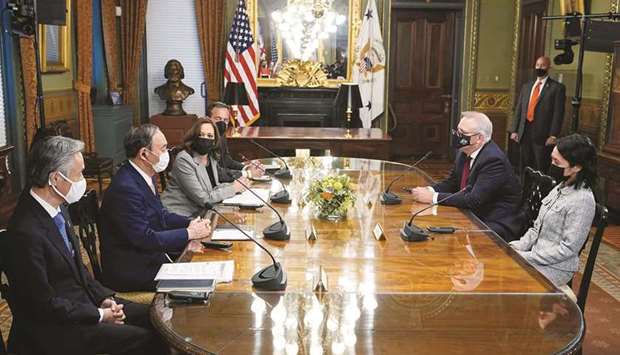Morrison told reporters after the meeting this will include connecting Australia’s raw minerals with manufacturing and processing capabilities, and with end users in the United States, India and Japan, according to a transcript released yesterday by his government.
Australia is the world’s biggest supplier of rare earths outside of China, and is a major supplier of minerals used in electric vehicle batteries, such as nickel, copper and cobalt. While the leaders did not publicly refer to China, they repeatedly insisted on rules-based behaviour in a region where China has been trying to flex its muscles. Beijing criticised the group as “doomed to fail.” The other Quad leaders expressed appreciation for Australia’s role in supplying critical materials “because that is a necessary supply for the many industries and processing works that they operate themselves”, Morrison said.
“On critical minerals, Australia is one of the biggest producers, but we believe we can play a bigger role in a critical supply chain that is supporting the technologies of the future.” Australia will host a clean-energy supply chain summit next year, aiming to develop a roadmap for building such supply chains in the Indo-Pacific region, Morrison said.
The Quad also discussed ways to better secure a semiconductor supply, Morrison said, as global carmakers and other manufacturers have cut production due to the shortage made worse by a Covid-19 resurgence in key Asian semiconductor production hubs. “This is an ecosystem we want to create and we want to do that... in the region,” he said.
President Joe Biden and the leaders of Australia, India and Japan highlighted their Quad group’s role in safeguarding a stable, democratic Indo-Pacific. The four leaders discussed their Covid vaccines drive, regional infrastructure, climate change and securing supply chains for the vital semiconductors used in computer technology.
“We liberal democracies believe in world order that favours freedom and we believe in a free and open Indo-Pacific because we know that’s what delivers a strong, stable, and prosperous region,” Australian Prime Minister Scott Morrison said at the start of the summit. That phrase “free and open” has become code for expressing the big regional powers’ worry about swelling Chinese economic, diplomatic and military presence – including threats to vital international sea lanes. “This event demonstrates the strong solidarity between our four nations and our unwavering commitment to the common vision of a free and open Indo-Pacific,” Japanese Prime Minister Yoshihide Suga said. Indian Prime Minister Narendra Modi hailed their countries’ “shared democratic values.” Biden, who often talks about democracies needing to prove their capability in an age of powerful autocracies in Russia and China, told the Quad they were on the frontline. “We’re four major democracies with a long history of co-operation. We know how to get things done and we are up to the challenge,” he said.
For Washington, the Quad meeting marked another step to reviving a US focus on diplomatic efforts, following its dramatic exit from the 20-year Afghanistan war. And of three regional groupings that Washington leads in its strategic chess game to manage China’s ascent, the Quad is deliberately the most open.
The other two are the Five Eyes intelligence-sharing alliance, comprising Australia, Canada, New Zealand, the United Kingdom and the United States, and the newest arrival on the block – Aukus. Aukus was unveiled only last week and centres so far on a project for Australia to acquire nuclear-powered submarines using US and British technology. Although it will take years for Australia’s navy to actually get the vessels, the announcement sent waves around the world, angering China and separately causing a furious row with France which saw its previously negotiated contract for selling Australia conventional submarines thrown out.
With the uproar over the Australian nuclear submarines plan only just dying down, officials and leaders were keen to stress there is no military component to the Quad. “This is not a military alliance. It’s an informal grouping of democratic states,” a senior US administration official said. “I think concerns have been dispelled and I believe at a general level this initiative is welcome across the region.”
Morrison, speaking to reporters, called the Quad a “very practical initiative.”
But – even if still not mentioning China directly – he made a pointed statement about Quad members being ready to stand up to “any pressure that would come on any of us.” “We want that opportunity for all countries in the Indo-Pacific,” he said. “They value their sovereignty. They value their independence, and that should be a shared project.”
Competition with China is at least as strong outside the military domain, including in the effort to supply poorer countries with vaccines — where the United States is by far the world’s top donor — and in stimulating pandemic-battered economies. Among the “substantial engagements” expected at the talks, the Quad will make announcements on its vaccine delivery plans, the administration official said.

Japanese Prime Minister Yoshihide Suga in the vice-president’s ceremonial office of the Eisenhower Executive Office Building at the White House.

Australian Prime Minister Scott Morrison.

